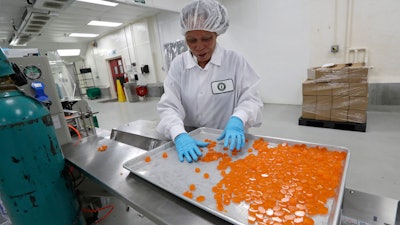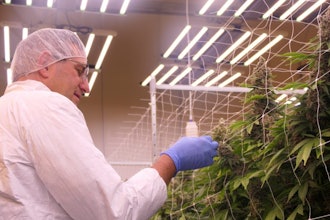
SEATTLE (AP) — At least a dozen marijuana samples typically show up every day at Trace Analytics, a lab in Spokane that tests products for Washington's legal cannabis industry.
On Tuesday, a single one arrived — a symptom of the most recent problems concerning the state's "seed-to-sale" tracking system.
Software glitches with the massive database last week began preventing businesses from transporting their products, costing them hundreds of thousands of dollars in lost sales and forcing some to furlough workers.
The issues have been a last straw for many marijuana businesses, prompting louder calls for the state to end its contract with the software vendor and to rethink the entire premise of its "traceability" program, which is intended to promote transparency in a formerly illegal industry but instead has been a source of headaches for regulators and businesses alike.
"Our small company lost four days of revenue-generating sales as a direct result of the state software system failure, and we're just one of hundreds of companies that experienced similar results," said Andy Brassington, chief financial officer of Evergreen Herbal, a Seattle company that makes marijuana-infused drinks and chocolates. "Those are sales you never get back. If you go to the grocery store and they're out of milk, you don't go back the next week and buy twice as much."
Vicki Christophersen, executive director of the Washington CannaBusiness Association, called the software issues "crippling."
State regulators have been working with the vendor — Denver-based MJ Freeway, the maker of Leaf Data Systems — as well as third-party software companies to address the problems, in some cases well into or through the night.
But on Tuesday, a week after a botched software update began causing the problems, the state Liquor and Cannabis Board took the unusual step of telling pot businesses they could come up with their own workarounds. The board told sellers to track data about test results and product shipping, but not to worry about strictly following traceability practices set out in state rules.
"The board recognizes there are challenges and problems associated with this software release they want to be able to alleviate in the short term," said agency spokesman Brian Smith.
MJ Freeway Chief Operating Officer Ray Thompson said in a Wednesday statement that the company worked quickly to remedy the problems.
"With these refinements, the state system is working per the specifications designed by the (cannabis board)," he said. "This release represents a significant improvement for the State of Washington's compliance tracking and we look forward to our ongoing partnership with (the board)."
MJ Freeway recently merged with another company to form Akerna, which began trading on the Nasdaq market last month.
Washington isn't the only state to have a hard time realizing its vision of a recreational or medical marijuana industry where every plant, joint and brownie are tracked and tested to ensure quality and avoid diversion to the black market.
More than a year after legal recreational sales began in California, only a fraction of the industry is participating in the system known there as "track-and-trace." Last year, Maryland's system temporarily bogged down, preventing sales, after a new feature was added. Pennsylvania's software has caused problems for cultivators trying to record shipments. Nevada abandoned MJ Freeway as a contractor after the company was hacked in 2017.
But Washington's issues have been persistent since MJ Freeway launched in Washington in early 2018.
"It's been pretty challenging for operators in the state to deal with traceability," said Gregory Foster, a member of the Liquor and Cannabis Board's Traceability Advisory Committee and the founder of Cannabis Observer, a website dedicated to monitoring the agency.
Last week's update was designed in part to allow testing results to be linked to products in the database, rather than have producers or processors voluntarily attest that the products had passed — a shortcoming that could allow gaming of the system, though no evidence has emerged of businesses doing so, Foster said.
Some in the industry are urging the board to adopt a system that allows businesses to keep track of their plants or products and report that information, subject to being audited, instead of requiring them to essentially obtain advance permission through a central database before shipping cannabis goods.
At Trace Analytics, business was down 25% last week, said Chief Operating Officer Jason Zitzer. If the company couldn't rely on funds from investors, it probably would have had to shut down, he said.
"The Liquor and Cannabis Board is taking the necessary, correct steps to make sure business still flows, but it's a real hurdle," Zitzer said. "They've got this vendor that's just not doing its job."






















